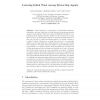Free Online Productivity Tools
i2Speak
i2Symbol
i2OCR
iTex2Img
iWeb2Print
iWeb2Shot
i2Type
iPdf2Split
iPdf2Merge
i2Bopomofo
i2Arabic
i2Style
i2Image
i2PDF
iLatex2Rtf
Sci2ools
140
click to vote
CIA
2007
Springer
2007
Springer
Learning Initial Trust Among Interacting Agents
Trust learning is a crucial aspect of information exchange, negotiation, and any other kind of social interaction among autonomous agents in open systems. But most current probabilistic models for computational trust learning lack the ability to take context into account when trying to predict future behavior of interacting agents. Moreover, they are not able to transfer knowledge gained in a specific context to a related context. Humans, by contrast, have proven to be especially skilled in perceiving traits like trustworthiness in such so-called initial trust situations. The same restriction applies to most multiagent learning problems. In complex scenarios most algorithms do not scale well to large state-spaces and need numerous interactions to learn. We argue that trust related scenarios are best represented in a system of relations to capture semantic knowledge. Following recent work on nonparametric Bayesian models we propose a flexible and context sensitive way to model and lea...
Related Content
| Added | 07 Jun 2010 |
| Updated | 07 Jun 2010 |
| Type | Conference |
| Year | 2007 |
| Where | CIA |
| Authors | Achim Rettinger, Matthias Nickles, Volker Tresp |
Comments (0)

